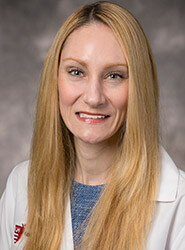University Hospitals Breast Surgeon Guides Cancer Patients Through Ever-Evolving Treatment Options
October 26, 2024
UH Clinical Update | October 2024
A physician’s training and work can bring immense contrasts, as was evident to Megan Miller, MD, early on. And it was exactly what she wanted.
 Megan Miller, MD
Megan Miller, MDShe went from growing up in Rochester, N.Y., where her father worked for Kodak, to becoming an Ivy League undergrad at Cornell University, where she majored in nutrition science, to being a medical student in the Flatbush neighborhood of Brooklyn. To her, that was one of the advantages of attending the State University of New York Downstate College of Medicine in Brooklyn.
“It was the exact opposite of my college environment – going to the densely populated heart of Flatbush, made up mostly of neighborhoods that were underserved,” she says. “Medical students got to do a lot they wouldn’t have done elsewhere – putting in chest tubes, drawing arterial blood gases. It was a very hands-on experience.”
She was soon drawn to the idea of becoming a surgeon. In her second year of residency at the University of Chicago, Dr. Miller’s advisor was a surgical oncologist who performed many breast surgeries.
“I liked being in the office with her,” she says. “Residents often don’t, because it’s not doing surgery, but I liked talking to the patients. In breast surgical oncology, there is follow-up. It’s not one and done. My advisor had a relationship with her patients and knew about their families, and patients were so grateful for her care.”
She also found the team approach to cancer care compelling, along with the fact that the types of surgeries and combinations of other treatments were based on evidence from many research studies on breast cancer.
Dr. Miller opted for extra years of training, including a fellowship in breast surgical oncology at Memorial Sloan Kettering Cancer Center, as well as a fellowship in medical ethics and training in clinical outcomes research, both at the University of Chicago.
She came to UH in 2017. Today, Dr. Miller maintains a clinical practice and continues her research, which includes a focus on disparities in oncologic outcomes and quality measures, such as delays in time from diagnosis to surgery. She also mentors residents and medical students, teaches them research skills and helps them present at national academic conferences.
She also appreciates how much of a say patients can have in what their treatment will look like. “Someone with a very small early-stage breast cancer who would have been well-served with a lumpectomy might strongly prefer a mastectomy,” Dr. Miller says. “I educate my patients and guide them through which treatment is recommended, but we decide together what that treatment is going to look like. I help them understand their options and that it is the biology of the cancer that drives the treatment and the outcome.”
Recently, Dr. Miller was one of the physicians who received a “Cliff Appreciates” award, for her professionalism and the compassion she shows her patients.
The treatment of breast cancer continues to evolve. Triple-negative breast cancer is one of the most aggressive subtypes. Several years ago, the pre-surgery chemotherapy treatment protocol for this subtype changed to a new, more effective regimen.
“Now potentially the patient can have less breast surgery because the cancer has already responded, or even disappeared completely,” she says. “When the lymph node response is also better, we can just remove and sample a few lymph nodes, whereas we used to take out all of them.”
The future will likely bring further de-escalation of treatment, says Dr. Miller. “Less surgery, less chemotherapy; we can even eliminate radiation for some patients. With more data from clinical trials, we will – and already do – personalize the treatment based on the woman and her cancer.
“So far, most women with breast cancer will still need some type of breast surgery, but the next 10 to 15 years will bring many advances,” she says.


